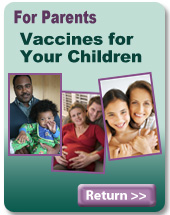Rotavirus - Fact Sheet for Parents
Diseases and the Vaccines that Prevent Them
Español: Rotavirus
Printer friendly version[340 KB, 2 pages]
Benefits of rotavirus vaccine
- Saves lives.
- Protects young children from serious disease.
Side effects of the rotavirus vaccine
Side effects are rare, usually mild, and may include the following:
- Fussiness
- Diarrhea
- Vomiting
- Fever
What is rotavirus?
Rotavirus is a virus that causes severe diarrhea and vomiting. It affects mostly babies and young children. Diarrhea and vomiting can lead to serious dehydration (loss of body fluid). If dehydration is not treated, it can be deadly. The rotavirus vaccine protects against this illness.
What are the symptoms of rotavirus?
Rotavirus causes the following:
- Fever
- Watery diarrhea
- Vomiting
- Stomach pain
Diarrhea and vomiting may last for 3 to 8 days. Children may stop eating and drinking while they are sick.
How serious is rotavirus?
Rotavirus can be very harmful. Diarrhea, vomiting, and fever can all cause a loss of body fluids. This leads to dehydration, which can be very dangerous, especially for babies and young children. Some children need an IV (needle in their vein) in the hospital to replace lost fluids.
How does rotavirus spread?
Rotavirus spreads easily. The virus is in the stool (feces) of people who are infected with the virus. It is spread by hands, diapers, or objects like toys, changing tables, or doorknobs that have a small amount of the stool on them. The disease commonly spreads in families, hospitals, and child care centers.
Rotavirus is a tough virus. It can live on objects for several days unless it is killed by a disinfectant (cleaner that kills germs). It is very hard to prevent rotavirus with just hand washing and cleaning with a disinfectant.
Vaccination is the best way to keep children safe from rotavirus.
What is the RotaTeq® and Rotarix®?
RotaTeq® and Rotarix® are brands of rotavirus vaccine. They are given by mouth, not by a shot.
The rotavirus vaccines protect children by preparing their bodies to fight the virus. Almost all children (85 to 98 children out of 100) who get the rotavirus vaccine will be protected from severe disease caused by the virus. The vaccine won’t stop diarrhea or vomiting caused by other germs, though.
When should my baby get the rotavirus vaccine?
Babies should get the first dose of the rotavirus vaccine at 2 months of age. For both vaccine brands, babies get a second dose at 4 months. A third dose of RotaTeq® is given at 6 months.
The rotavirus vaccine should not be started after a baby is 15 weeks old. Babies should get all doses by 8 months of age.
Babies can get the rotavirus vaccine at the same time as other vaccines.
 Why should my baby get the rotavirus vaccine?
Why should my baby get the rotavirus vaccine?
The vaccine prevents almost all cases of serious diarrhea from rotavirus. Most children who get the vaccine will not get rotavirus diarrhea at all.
Is the rotavirus vaccine safe?
The rotavirus vaccine is very safe, and it is effective at preventing rotavirus disease. RotaTeq® and Rotarix® have been tested with more than 70,000 patients. Millions of babies in the U.S. have gotten the vaccine safely.
Some studies have shown a small rise in cases of intussusception within a week after the first dose of rotavirus vaccine. Intussusception is a type of bowel blockage that is treated in a hospital. Some babies might need surgery. About 1 infant out of 100,000 might get intussusception.
In March 2010, the FDA (agency that approves vaccines) learned that a virus or parts of a virus called porcine circovirus (PCV) is in both brands of rotavirus vaccine. There is no evidence that PCV causes illness or other safety risks in humans.
If my baby does not get the rotavirus vaccine, will he get rotavirus?
Rotavirus is a very common disease. Almost all children in the U.S. are infected with rotavirus before they are 5 years old. Without the vaccine, children are very likely to get rotavirus diarrhea.
Before the vaccine, rotavirus sent more than 200,000 children in the U.S. to the emergency room each year. It caused 20 to 60 deaths each year, and 55,000 to 70,000 people needed care in the hospital.
Where can I learn more about the rotavirus vaccine?
To learn more about the rotavirus vaccine or other vaccines, talk to your child’s doctor.
Call 800-CDC-INFO (800-232-4636) or go to the CDC Vaccines web site and check out the following resources:
- Vaccines and Preventable Diseases - Rotavirus Vaccination
- Common Questions Parents Ask about Infant Immunizations
- Vaccines website for parents
Fact Sheets for Parents
Diseases and the Vaccines that Prevent Them
![]() This symbol means you are leaving the CDC.gov Web site. For more information, please see CDC's Exit Notification and Disclaimer policy.
This symbol means you are leaving the CDC.gov Web site. For more information, please see CDC's Exit Notification and Disclaimer policy.
Copyrighted images: Images on this website which are copyrighted were used with permission of the copyright holder and are not in the public domain. CDC has licensed these images for use in the materials provided on this website, and the materials in the form presented on this website may be used without seeking further permission. Any other use of copyrighted images requires permission from the copyright holder.
Contact Us:
- Centers for Disease Control and Prevention
1600 Clifton Rd
Atlanta, GA 30333 - 800-CDC-INFO
(800-232-4636)
TTY: (888) 232-6348 - New Hours of Operation
8am-8pm ET/Monday-Friday
Closed Holidays - cdcinfo@cdc.gov




